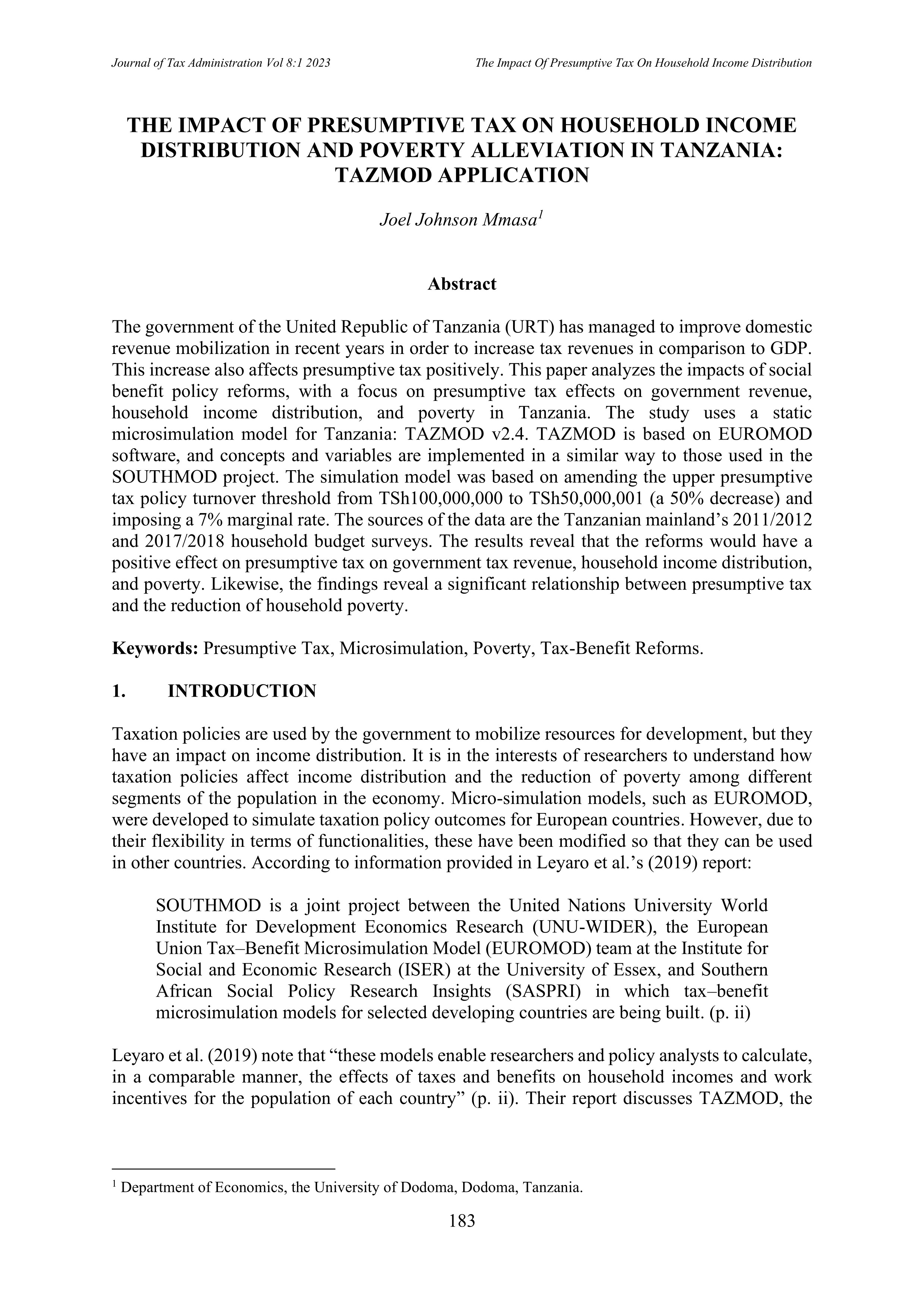The Impact of Presumptive Tax on Household Income Distribution and Poverty Alleviation in Tanzania: TAZMOD Application
Keywords:
Presumptive Tax, Microsimulation, Poverty, Tax-Benefit ReformsAbstract
The government of the United Republic of Tanzania (URT) has managed to improve domestic revenue mobilization in recent years in order to increase tax revenues in comparison to GDP. This increase also affects presumptive tax positively. This paper analyzes the impacts of social benefit policy reforms, with a focus on presumptive tax effects on government revenue, household income distribution, and poverty in Tanzania. The study uses a static microsimulation model for Tanzania: TAZMOD v2.4. TAZMOD is based on EUROMOD software, and concepts and variables are implemented in a similar way to those used in the SOUTHMOD project. The simulation model was based on amending the upper presumptive tax policy turnover threshold from TSh100,000,000 to TSh50,000,001 (a 50% decrease) and imposing a 7% marginal rate. The sources of the data are the Tanzanian mainland’s 2011/2012 and 2017/2018 household budget surveys. The results reveal that the reforms would have a positive effect on presumptive tax on government tax revenue, household income distribution, and poverty. Likewise, the findings reveal a significant relationship between presumptive tax and the reduction of household poverty.
References
Decoster, A., Pirttilä, J., Sutherland, H., & Wright, G. (2019). SOUTHMOD: Modelling tax-benefit
systems in developing countries. International Journal of Microsimulation, 12(1), 1–12. https://doi.org/10.34196/ijm.00192
Fjeldstad, O.-H. (2001). Taxation, coercion and donors: Local government tax enforcement in Tanzania. The Journal of Modern African Studies, 39(2), pp. 289–306. https://doi.org/10.1017/S0022278X01003627
George, C., & Olan’g, L. (2020). Taxing the informal sector: A case of Dar es Salaam street vendors (REPOA Brief No. PB 6/2020). REPOA.
Jara, H. X., & Schokkaert, E. (2017). Putting measures of individual well-being to use for ex-ante policy evaluation. The Journal of Economic Inequality, 15(4), 421–440. https://doi.org/10.1007/s10888-017-9370-x
Jara, H. X., & Varela, M. (2017). Tax-benefit microsimulation and income redistribution in Ecuador (WIDER Working Paper, 2017/177). UNU-WIDER. https://doi.org/10.35188/UNU-WIDER/2017/403-2
Leyaro, V., Kisanga, E., Noble M., Wright, G., & McLennan, D. (2019). SOUTHMOD country report: Tanzania: TAZMOD v1.8, 2012, 2015, 2016, 2017, 2018. UNU-WIDER.
Machogu, C., & Amayi, J. B. (2013). The effect of taxpayer education on voluntary tax compliance, among SMEs in Mwanza City - Tanzania. International Journal of Marketing, Financial Services and Management Research, 2, 12–23.
Mas-Montserrat, M., Colin, C., Ribault, E., & Brys, B. (2023). The design of presumptive tax regimes (OECD Taxation Working Papers No. 59). OECD Publishing. https://doi.org/10.1787/141239bb-en
National Bureau of Statistics. (2014). Tanzania mainland: Household budget survey: Main report, 2011/12. National Bureau of Statistics.
National Bureau of Statistics. (2020). Tanzania mainland household budget survey 2017/18: Final report. National Bureau of Statistics.
Osoro, N. E. (2010). Domestic resource mobilization in Sub-Saharan Africa: The case study of Tanzania. The North-south Institute/ L'Institut Nord-Sud.
Semboja, H. H. (2015). Presumptive tax system and its influence on the ways informal entrepreneurs behave in Tanzania. Tanzanian Economic Review, 5(1-2), 72–90.
Semboja, J., & Msafiri, D. (2022). The performance of tax revenues in Tanzania: An attempt at explanation (REPOA Brief No. PB 18/2022). REPOA. https://www.repoa.or.tz/wpcontent/uploads/2022/12/The-Performance-of-Tax-Revenues-in-Tanzania-An-attempt-atexplanation-PB-18.pdf
Sheikh Obid, S. N. (2008, 06 November). Voluntary compliance: Tax education preventive. International Conference on Business and Economy, Constanta, Romania.
Tanzania Investment Center. (n.d.). Paying tax. Tanzania Investment Center. https://procedures.tic.go.tz/menu/205?l=en
Tanzania Revenue Authority. (n.d.). Income tax for individuals: Submitting the return.
Tanzania Revenue Authority. https://www.tra.go.tz/index.php/income-tax-for-individual
Tanzania Revenue Authority/University of Dar es Salaam. (2011). The study of informal sector presumptive taxation in Tanzania 2010. Tanzania Revenue Authority.
Thuronyi, V. (Ed.). (1996). Tax law design and drafting (Vol 1). International Monetary Fund. https://doi.org/10.5089/9781557755872.071
United Republic of Tanzania. (2003). Small and medium enterprise development policy. United Republic of Tanzania, Ministry of Industry and Trade. http://www.tzonline.org/pdf/smallandmediumenterprisedevelopmentpolicy.pdf
United Republic of Tanzania. (2012). Speech by the Minister for Finance Hon. Dr. William Augustao Mgimwa (M.P.), introducing to the National Assembly, the estimates of government revenue and expenditure for the fiscal year 2012/2013. United Republic of Tanzania, Ministry of Finance.
United Republic of Tanzania. (2013). Speech by the Minister for Finance Hon. Dr. William Augustao Mgimwa (MP) introducing to the National Assembly, the estimates of government revenue and expenditure for fiscal year 2013/2014. United Republic of Tanzania, Ministry of Finance.
United Republic of Tanzania. (2014). Speech by the Minister for Finance Hon. Saada Mkuya Salum (MP) introducing to the National Assembly, the estimates of government revenue and expenditure for fiscal year 2014/2015. United Republic of Tanzania, Ministry of Finance.
United Republic of Tanzania. (2016, March 30). National five year development plan 2016/17–2020/21: “Nurturing industrialization for economic transformation and human development”. United Republic of Tanzania, Ministry of Finance and Planning.
United Republic of Tanzania. (2018). Speech of the government budget for the year 2018-2019. United Republic of Tanzania, Ministry of Finance and Planning.
United Republic of Tanzania. (2020). Performance audit report on revenue collection from own sources in local government authorities as performed by the president’s office―regional administration and local government: Report of the controller and auditor general of the United Republic of Tanzania: March 2020. United Republic of Tanzania, National Audit Office. https://www.nao.go.tz/uploads/REVENUE_COLLECTION_FROM_OWN_SOURCES_IN_LOCAL_GOVERNMENT_AUTHORITIES.pdf
United Republic of Tanzania. (2021, June). National five-year development plan 2021/22 – 2025/26: “Realising competitiveness and industrialization for human development”.
United Republic of Tanzania, Ministry of Finance and Planning. https://www.tro.go.tz/wp-content/uploads/2021/06/FYDP-III-English.pdf
Wright, G., Leyaro, V., Kisanga, E., & Byaruhanga, C. (2019). Policy transparency in the public sector: The case of social benefits in Tanzania. International Journal of Microsimulation, 12(1), 83–104. https://doi.org/10.34196/ijm.00195

Downloads
Published
How to Cite
Issue
Section
License
Copyright (c) 2023 Joel Johnson Mmasa

This work is licensed under a Creative Commons Attribution 4.0 International License.
Our open access status means that authors retain the copyright of their work. However, all papers published in JOTA are done so under a Creative Commons Attribution 4.0 International license (CC BY). This means that others can share and/or adapt your work without your permission as long as they follow certain rules, including attributing your work correctly.
You can learn more about this on our Open Access, Licensing, and Copyright Policies page.



